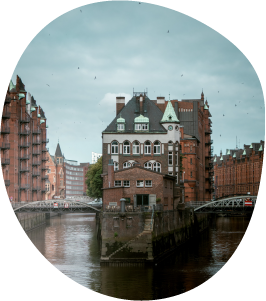VISITEZ LA Allemagne
Des gens sérieux, des châteaux magnifiques, des randonnées fantastiques et des soirées techno endiablées sont tous synonymes de cette nation énorme et diversifiée.
Monnaie
€ - Euro (1€ ≃ 1,05$ ≃0,86£)
POPULATION
83 millions
LANGUE
Allemand
SUPERFICIE
357,592 km²
FUSEAU HORAIRE
UTC+1 / UTC+2
DRAPEAU
🇩🇪


PROFITEZ DE L'EAU À HAMBOURG
Hambourg est une ville d'eau, située là où l'Elbe s'élargit dans l'océan et abrite un large port et près de 2500 ponts.

PROMENEZ-VOUS LE LONG DU MUR DE BERLIN
Avec plus de 100 peintures murales d'artistes internationaux, la East Side Gallery se distingue parmi les endroits où vous pouvez encore voir des vestiges du mur de Berlin.

VISITEZ DES CHÂTEAUX DE CONTE DE FÉES
Le château de Neuschwanstein est une construction de rêve entourée d'un paysage magnifique, qui a même inspiré Walt Disney.

EXPLOREZ LA FORÊT NOIRE
La Forêt-Noire est une chaîne de montagnes réputée pour sa forêt dense à feuilles persistantes et ses villages pittoresques, souvent associés aux contes des frères Grimm.

FAITES LA FÊTE À BERLIN
La Forêt Noire est une chaîne de montagnes réputée pour sa forêt dense à feuilles persistantes et ses villages pittoresques, souvent associés aux contes des frères Grimm.
Pick a German destination

Berlin
L'une des villes les plus créatives, branchées et progressistes d'Europe, voire du monde

Hamburg
La "porte du monde" de l'Allemagne grâce à son port gigantesque
Prepare your trip to Germany
💡 Why visit Germany?
Germany offers a captivating blend of historic landmarks, dynamic cities, and scenic landscapes. From the fairytale castles of Bavaria et une medieval old towns to modern metropolises like Berlin and Frankfurt, the country is packed with cultural, architectural, and culinary treasures. It’s also known for its efficient transport, festive traditions, and varied regions, from the Alps to the North Sea.
🪪 Do I need a visa to visit Germany?
Germany is part of the Schengen area. Citizens of the EU, USA, Canada, Australia, and many other countries can enter visa-free for up to 90 days within a 180-day period. However, some nationalities do require a visa. It’s best to check with the nearest German embassy or consulate for the most up-to-date information specific to your situation.
INFORMATION IMPORTANTE: Les informations ci-dessous sont fournies à titre indicatif et s'appliquent uniquement aux visas de tourisme de courte durée. Avant votre voyage en Allemagne, ou si vous envisagez de venir en Allemagne dans un autre but (work, studies, …), check the official information on the European Commission website’s page about Schengen visa application: https://www.home-affairs.ec.europa.eu/
⏳ Visa-free but limited to maximum 90 days for a period of 180 days if you are a citizen of one of the following countries: Albanie; Andorre; Antigua-et-Barbuda; Argentine; Australie; Autriche; Bahamas ; Bahreïn ; Barbade ; Belgique; Bosnie Herzégovine; Brésil; Brunéi ; Bulgarie; Canada; Chili; Chine; Colombie; Costa Rica; Croatie; Chypre; Tchéquie ; Danemark; Dominique ; Le Salvador; Estonie; Finlande; France; Géorgie; Allemagne; Grèce; Grenade ; Guatemala; Honduras; Hong Kong; Hongrie; Islande; Irlande; Israël; Italie; Japon; Kiribati ; Koweit; Lettonie; Liechtenstein ; Lituanie; Luxembourg, Macao ; Malaisie; Malte; Iles Marshall; Maurice ; Mexique; Micronésie; Moldavie; Monaco; Monténégro; Pays-Bas; Nouvelle-Zélande; Nicaragua; Macédoine du Nord; Norvège; Oman; Palaos ; Panama; Paraguay ; Pérou; Pologne; Le Portugal; Qatar; Roumanie; Saint-Christophe-et-Niévès; Sainte-Lucie; Saint-Vincent-et-les-Grenadines; Samoa ; Saint Marin; Serbie; Les Seychelles; Singapour; Slovaquie; Slovénie; Iles Salomon; Corée du Sud; Espagne; Suède; Suisse; Taïwan; Timor oriental ; Tonga ; Trinité-et-Tobago; Turquie; Tuvalu; Emirats Arabes Unis; Royaume-Uni; États-Unis d'Amérique; Uruguay; Vanuatu; Vatican; Venezuela
🛂 Visa required if you are a citizen of one of the following countries: Afghanistan ; Algérie; Angola; Arménie; Azerbaïdjan; Bahreïn ; Bengladesh ; Biélorussie ; Bélize ; Bénin ; Bhoutan; Bolivie; Bostwana ; Burkina Faso; Burundi; Cambodge; Cameroun; Cap-Vert; République centrafricaine; Tchad; Chine; Comores ; Congo; Congo (Rép. Dém.); Côte d'Ivoire (Côte d'Ivoire); Cuba; Djibouti; République dominicaine; Équateur; Egypte; Guinée Équatoriale; Érythrée ; Eswatini ; Ethiopie; Fidji ; Gabon; Gambie; Ghana; Guinée; Guinée-Bissau ; Guyane; Haïti; Inde; Indonésie; Iran; Irak; Jamaïque; Jordan; Kazakhstan; Kenya; Kosovo; Koweit; Kirghizistan ; Laos; Liban; Lesotho; Libéria; Libye; Madagascar; Malawi; Maldives; Mali; Mauritanie ; Mongolie; Maroc; mozambicain ; Birmanie ; Namibie ; Nauru ; Népal; Niger; Nigeria; Corée du Nord; Oman; Pakistan; Palestine; Papouasie Nouvelle Guinée; Philippines ; Qatar; Russie; Rwanda; Sao Tomé et Principe ; Arabie Saoudite; Sénégal; Sierra Leone; Somalie; Afrique du Sud; Soudan du sud; Sri Lanka; Soudan; Surinam ; Syrie; Tadjikistan ; Tanzanie; Thaïlande; Togo; Tunisie; Turquie; Turkménistan; Ouganda; Ouzbékistan; Vanuatu; Vietnam ; Yémen; Zambie; Zimbabwe
⛅ When is the best time to visit Germany?
❄️ December – February: Winter is cold, but magical thanks to Germany’s world-famous Christmas markets, especially in cities like Dresden and Nuremberg. Temperatures range from -1°C (30°F) to 5°C (41°F), with snowfall common in the south.
🌱 March – May: Spring brings blooming parks, mild temperatures, and fewer crowds—perfect for city sightseeing or countryside walks. Outdoor cafés begin to open, and festivals start returning.
☀️ June – August: Summer is warm and lively, with temperatures between 15°C (59°F) and 25°C (77°F). It’s festival season, with open-air events, river cruises, and beer gardens in full swing. Popular destinations can be crowded—booking in advance is recommended.
🍂 September – November: Autumn sees cooler weather and vibrant fall foliage, especially along wine routes and forested areas. September and October are harvest and wine festival months, while late November kicks off the Christmas market season.
🚉 How to get around Germany?
Germany has one of Europe’s best transport systems:
🚌 Buses: Long-distance buses like Flixbus offer budget-friendly connections between cities. Regional buses serve smaller towns and are often coordinated with local train services.
🚂 Trains: Train travel is excellent in Germany. The Deutsche Bahn network includes high-speed ICE trains that connect major cities like Berlin, Munich, and Cologne. Regional trains cover smaller towns and scenic routes.
🚗 Car Rental: Renting a car is ideal for exploring regions like Bavaria, the Romantic Road, or the Black Forest. Roads are well-maintained, and the autobahn allows for high-speed travel, but be aware of speed limits in marked zones. An International Driving Permit (IDP) is not required if your license is in Latin script.
💳 Can I use bank cards or cash for payments in Germany?
While card payments are increasingly common, many small businesses and restaurants still prefer cash. Visa and Mastercard are widely accepted, but some places do not take American Express. It’s advisable to carry some euros, especially in rural areas or markets.
🔌 What type of plugs and voltage does Germany use?
Germany uses plug types C and F, both with two round pins. The standard voltage is 230V and the frequency is 50Hz.
If needed, you can order an universal travel plug adapter here.
🪙 Is tipping customary in Germany?
Tipping is appreciated and customary in restaurants, cafés, and taxis. A tip of around 5-10% is typical. In casual settings, rounding up the bill is also acceptable.
🥛 Is it safe to drink tap water in Germany?
Tap water is safe to drink throughout Germany.
📅 When are public holidays and store closing days in Germany?
In Germany, some stores are closed on Sundays. There are 5 national public holidays in Germany:
- New Year’s Day (January 01)
- Good Friday et une Easter Monday (dates vary)
- Labour Day (1er Mai)
- German Unity Day (3 Octobre)
- Christmas Day (December 25)
Other holidays vary by state, such as Corpus Christi or All Saints’ Day.
Ces jours-là, la plupart des entreprises et des bureaux seront fermés, et de nombreuses attractions peuvent être fermées ou avoir des heures d'ouverture limitées.
🚦 What are the speed limits in Germany?
In Germany, traffic drives on the right-hand side of the road. The main speed limits are as follows:
- 50 kph / 30 mph in urban areas
- 100 kph / 62 mph on rural areas
- No general speed limit on certain stretches of the autobahn (unless otherwise indicated), though 130 kph (81 mph) is recommended
During adverse weather (rain, fog, etc.), the speed limits are lowered.
💬 What are some basic German words I should know?
- Hello (informal) = Hallo
- Good day = Guten Tag
- Goodbye = Auf Wiedersehen
- Yes = Ja
- No = Nein
- Thank you = Danke
- Please = Bitte
- You’re welcome = Gern geschehen
- Excuse me = Entschuldigung
- Day = Tag
- Night = Nacht
- Good evening = Guten Abend
- Goodnight = Gute Nacht
- Mister = Herr
- Ma’am = Frau
- Street = Straße
- Road = Weg
💡 Tip: With the GoogleTranslate app, you can download the German language to use it even offline!
🛡️ Is it safe to travel in Germany?
Germany is generally very safe for travelers. Public transport, cities, and tourist areas are well-policed and well-lit. Still, it’s important to take the usual precautions:
Secure Your Belongings: Pickpocketing can occur in crowded areas, especially train stations and festivals.
Emergency Numbers: Dial 112 anywhere in Germany for police, fire, or medical assistance.










